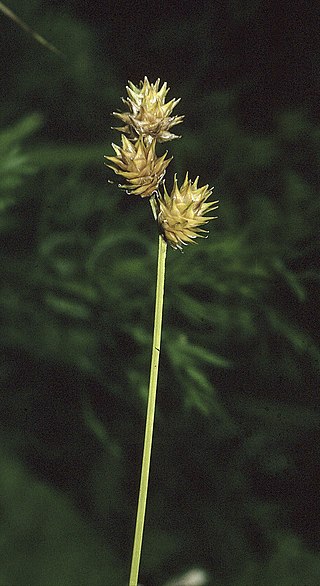
Carex jamesii, known as James's sedge or grass sedge, is a species of sedge native to North America from Minnesota east to New York and south to Oklahoma and South Carolina. It occurs in mesic hardwood forests and produces fruits from early May to mid July. It has two to four perigynia that are subtended by leaf-like pistillate scales. Its seeds are dispersed by ants.

Lysimachia thyrsiflora, the tufted loosestrife, is a plant in the genus Lysimachia. It is native to large sections of the northern Northern Hemisphere, including Eurasia and North America. It often grows in marshes, shorelines of lakes and ponds and occasionally along streams. It is an erect perennial herb growing up to 80 centimeters tall and bearing yellow flowers, sometimes dotted with purple. It may be confused with purple loosestrife when not blooming but can be easily distinguished because purple loosestrife has a square stem. Tufted loosestrife has been used medicinally in Asia to combat high blood pressure.

Carex sect. Ovales is a section of the genus Carex, containing around 85 species of sedge. It is the most diverse section of the genus in North America, containing 72 species:

Carex davisii, known as Davis' sedge or awned graceful sedge, is a species of Carex native to North America. It is listed as an endangered, threatened, or species of concern across much of edge of its range. It was named in the 1820s by Lewis David de Schweinitz and John Torrey in honor of Emerson Davis (1798–1866), a Massachusetts educator and "enthusiastic student of the genus" Carex.

Carex bromoides, known as brome-like sedge, brome-sedge, and dropseed of the woods, is a species of sedge in the genus Carex. It is native to North America.

Carex woodii, known as pretty sedge, is a species of sedge native to North America.

Carex bicknellii, known as Bicknell's sedge and copper-shouldered oval sedge, is a species of sedge native to North America. Carex bicknellii grows in small clumps with fewer than 25 flowering stems per clump. It is found in mesic to dry prairies, savannas, and open woodlands.

Carex sect. Phacocystis is a section of the genus Carex, containing between 70 and 90 species worldwide. With 31 species in the North American flora, sedges in Carex sect. Phacocystis commonly occur in wetlands such as shorelines, marshes, and tundra.
Carex albolutescens, known as greenish-white sedge or greenwhite sedge is a species of sedge native primarily to the lower Midwest and Eastern United States. C. albolutescens grows in wetlands, with an affinity toward acidic soils in swamps and woodlands.

Carex bebbii, Bebb's sedge, is a species of sedge native to the northern United States and Canada. Carex bebbii grows in a variety of wetland habitats such as lakeshores, streambanks, ditches, meadows, swamps, and seeps. It forms dense tufts with culms up to 90 centimeters tall.

Carex tenera, known as quill sedge, is a species of sedge native to the northern United States and Canada.

Carex brevior, known as shortbeak sedge and plains oval sedge, is a species of sedge native to North America. The specific epithet brevior means "shorter" in Latin.
Carex shinnersii is a species of sedge described in 2001. It is native to North America, found in Arkansas, Kansas, Oklahoma, and Texas.

Carex silicea, known as beach sedge, is a species of sedge native to North America. It is found in the northeastern United States and southeastern Canada.
Carex stenoptila, known as riverbank sedge, is a species of sedge native to North America.

Carex straminea, known as eastern straw sedge, is a species of sedge native to North America.
Carex suberecta, known as prairie straw sedge, is a species of sedge native to North America.

Carex muehlenbergii is a species of flowering plant, it is a type of sedge. It is a grass-like plant in the family Cyperaceae. Its common names include sand sedge, Muhlenberg's sedge.
Carex deweyanaDewey's sedge, short-scale sedge, is a species of sedge native to Canada and the United States.
Carex peckii, Peck's sedge, Peck's oak sedge, or white-tinged sedge, is a species of sedge native to Canada and the United States.














